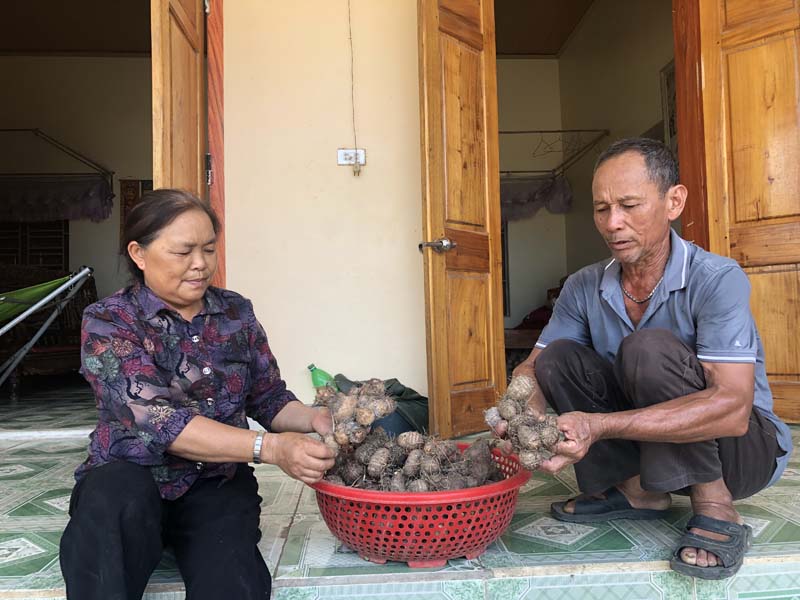
(HBO) - Taros made by Yen Tri agricultural cooperative in Yen Tri commune have been selected by Yen Thuy district to join the provincial-level One Commune, One Product (OCOP) programme in 2020.
 Members of Yen Tri agricultural cooperative (Yen Thuy)
prepare quality taro seedlings.
Members of Yen Tri agricultural cooperative (Yen Thuy)
prepare quality taro seedlings.
Yen Tri taro has a good and delicious taste, wining consumers’ favour. Taro growing brings high
profits to farmers. The communal Party committee and authorities encouraged
local residents to expand farming areas meeting OCOP standards to improve product value and create a stable
consumption market.
Yen Tri commune is home to about 20 ha of taros grown in all hamlets, mostly in Ao Hay with seven ha. Bui Xuan Bac from Ao Hay hamlet, a member of Yen Tri agricultural cooperative said his family plants around 3,000 sq.m of taros this year, yielding more than four tonnes. Taro is drought-resistant,
easy to grow with few pests.
With the use of decomposed manure, taro plants grow
well with a lot of tubers. Thanks to mastering cultivation techniques, taros
enjoy bumper harvest almost every year. Selling prices are stable, ranging from
15,000 – 17,000 VND per kg. Income from taro cultivation is 4-5 times higher
than rice. This year, the cooperative’s taro products register to join the OCOP
programme. "As quality is a crucial factor, we are aware of improving it,” Bac said.
In order to help the
cooperative join the programme, the communal Party Committee and authorities partnered with the cooperative to raise its
members and farming households’ awareness of expanding taro area, farming
techniques and set of criteria for OCOP grading.
The cooperative
registered for origin traceability and is completing dossier and packaging. It
also partnered with taro farming households to expand cultivation areas and
ensure the supply of materials. For the next crop, the commune plans to grow
nearly 7ha of taros meeting VietGAP standards. If meeting OCOP standards, its
value will be raised, contributing to ensuring the sustainable development of
local agriculture sector and improving farmers’ lives./.
Hoa Binh province is undergoing a dynamic transformation amid Vietnam’s national digital transition. Building on Poliburo’s Resolution No. 57-NQ/TW on breakthroughs in science, technology, innovation, and national digital transformation, the province has rolled out a wide range of practical action plans. A standout initiative is the "Digital Literacy for All” movement, an effort to ensure that no one is left behind in the digital era.
Hoa Binh province is undergoing a dynamic transformation in the wake of the national digital transformation movement. Building on Resolution No. 57-NQ/TW of the Politburo on breakthroughs in science, technology, innovation, and national digital transformation, the province has implemented a wide range of practical action plans. A standout initiative is the "Digital Literacy for All” movement ambitious effort to ensure that no one is left behind in the digital age.
With a spirit of unity and proactive problem-solving, the Party Committee, the government and the people of Dong Lai Commune (Tan Lac District) have made great strides in implementing the resolutions of the 24th Party Congress of the commune for the 2020 - 2025 term. Focusing on leadership and practical actions, the commune has brought the Party’s resolutions into daily life, creating strong impacts and pushing the local development forward.
Amid the nationwide push for digital transformation, young people in Hoa Binh Province are stepping up as dynamic pioneers, applying technology to enhance Youth Union operations and expand the reach of youth-led initiatives. Through creativity and adaptability, Youth Union organizations at all levels have introduced a series of practical solutions, contributing to modern governance and community development.
In recent years, An Nghia commune, located in Lac Son district, has stepped up administrative reform, focusing on improving the quality and efficiency of its single-window service unit for receiving and processing administrative procedures. These improvements have helped create favourable conditions for local residents and organisations to handle administrative procedures, contributing to the commune’s broader socio-economic development.
The Prime Minister-approved master plan to develop the multi-use value of forests ecosystems through 2030, with a vision to 2050, aims to improve the management and sustainable use of forest resources, create jobs, increase incomes, and improve the living standards of ethnic minorities, people in mountainous and remote areas, forest workers and those living near forests.



 Members of Yen Tri agricultural cooperative (Yen Thuy)
prepare quality taro seedlings.
Members of Yen Tri agricultural cooperative (Yen Thuy)
prepare quality taro seedlings.